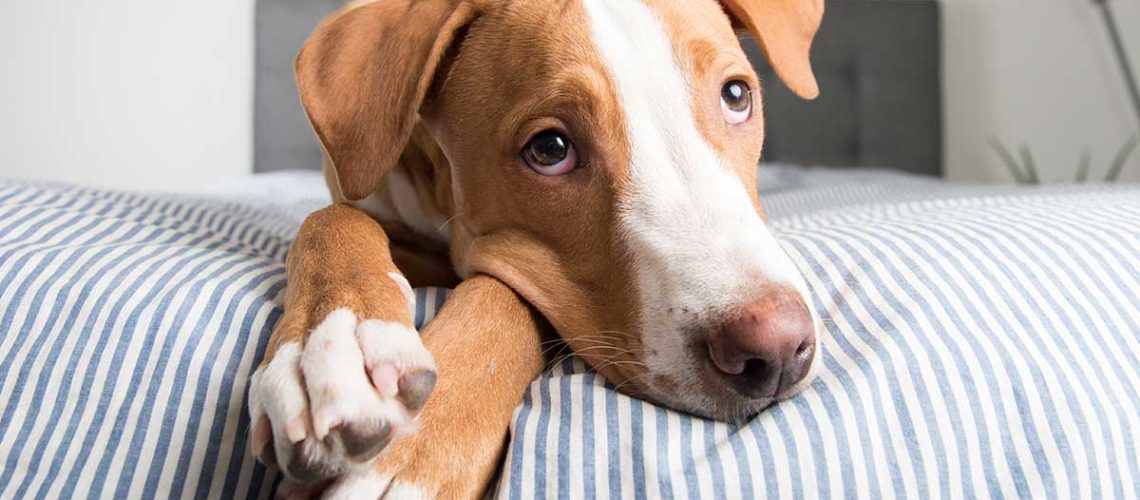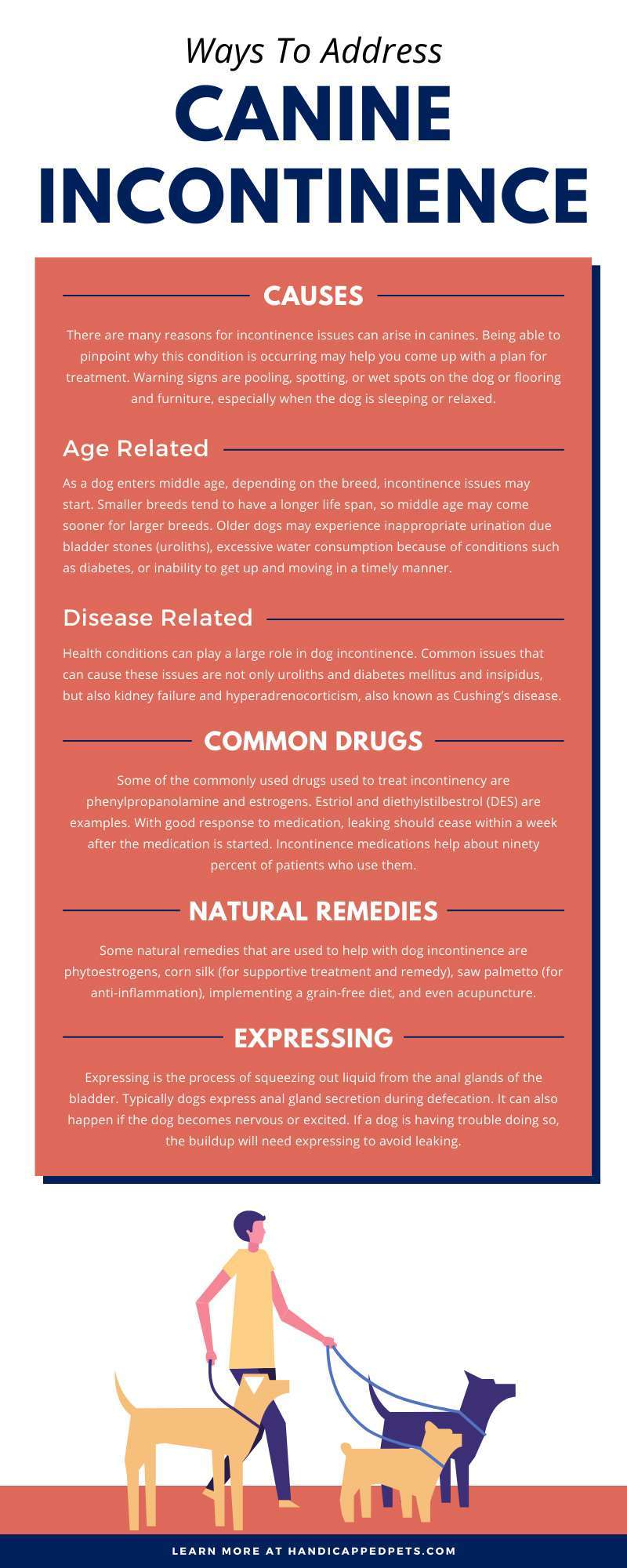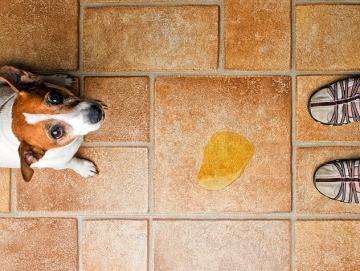Key Takeaways:
- 1. Dogs may pee on the bed due to medical issues such as urinary tract infections or bladder problems.
- 2. Stress or anxiety can cause dogs to urinate on the bed as a way of marking their territory.
- 3. Lack of proper house training or inconsistent reinforcement can lead to dogs peeing on the bed.
- 4. Senior dogs may experience incontinence, leading them to accidentally urinate on the bed.
- 5. It is important to consult a veterinarian to rule out any underlying health issues and to address behavioral problems through training and consistency.
Introduction:
Have you ever woken up to a damp surprise on your bed, courtesy of your furry friend? It's not the most pleasant way to start your day, but understanding why dogs pee on our beds can actually be quite beneficial. By delving into this topic, you'll gain valuable insights that can help improve the relationship with your canine companion. Plus, it might even save you from having to change your sheets every morning! So, let's uncover the reasons behind this puzzling behavior and discover how we can address it together. Get ready to explore the fascinating world of doggie bathroom habits and unlock the secrets to a dry and cozy bed.
Why does my dog pee on my bed?
Possible reasons why dogs pee on their owner's bed
There can be several reasons why your dog is peeing on your bed. One possible reason is that they may not be fully house trained yet. If your dog is still a puppy, they may not have learned to hold their bladder for long periods of time and may have accidents on your bed. Another reason could be marking behavior. Dogs have scent glands in their urine, and by peeing on your bed, they are marking it as their territory.
Additionally, stress or anxiety can also cause dogs to urinate in inappropriate places like the bed. Dogs can experience anxiety due to changes in their environment, separation from their owners, or even medical issues. It's important to identify the underlying cause of this behavior to address it effectively.
How to stop your dog from peeing on your bed
If you want to prevent your dog from peeing on your bed, there are several steps you can take. First and foremost, make sure that your dog has regular access to appropriate bathroom areas and provide them with plenty of opportunities to relieve themselves outside. Establishing a consistent routine for bathroom breaks can help reinforce proper toilet habits.
It's also essential to properly crate train or confine your dog when you cannot supervise them. This will prevent them from having access to the bed and reduce the likelihood of accidents occurring. Positive reinforcement training techniques can also be used to reward good behavior and discourage unwanted behaviors like peeing on the bed.
Medical conditions that may cause a dog to urinate on the bed
In some cases, dogs may pee on the bed due to underlying medical conditions. Urinary tract infections (UTIs), bladder stones, or other urinary issues can cause dogs to have accidents in the house, including on the bed. If you notice your dog frequently urinating on the bed or displaying other signs of discomfort during urination, it's important to consult with a veterinarian.
The vet will be able to conduct tests and examinations to determine if there are any medical issues contributing to the behavior. If a medical condition is identified, appropriate treatment can be provided to alleviate the problem and prevent further accidents.
What to do if your dog has already peed on your bed
If your dog has already peed on your bed, it's crucial to clean up the mess properly. Start by removing any bedding or fabric that has been soiled and wash it with an enzymatic cleaner specifically designed for pet urine. This will help break down the odor-causing molecules and discourage your dog from returning to that spot.
Next, thoroughly clean the mattress or any other surfaces affected by urine using a mixture of water and vinegar or a pet-specific stain and odor remover. Allow the area to dry completely before using it again. It may also be helpful to provide your dog with an alternative comfortable sleeping area, such as a designated dog bed, while you work on preventing future accidents.
Anxiety and stress as reasons for dogs peeing on the bed
Dogs can experience anxiety and stress just like humans do, and this can lead them to pee on their owner's bed as a form of coping mechanism. Changes in routine, loud noises, separation from their owners, or even new additions to the household can trigger anxiety in dogs.
To help reduce anxiety-related urination on the bed, it's important to create a calm environment for your dog. This can include providing them with a safe space where they feel secure, using calming aids such as pheromone diffusers or anxiety wraps, and gradually exposing them to the triggers that cause stress. If the anxiety persists, consulting with a professional dog trainer or veterinarian can provide further guidance and support.
Puppy training: How to prevent them from peeing on the bed
When it comes to puppies, preventing them from peeing on the bed requires consistent training and patience. Start by establishing a regular feeding and bathroom schedule for your puppy. Take them outside after meals, naps, playtime, and before bedtime to give them ample opportunities to relieve themselves in appropriate areas.
If you catch your puppy starting to pee on the bed, quickly redirect their attention and take them outside to finish eliminating. Rewarding your puppy with praise or treats when they eliminate in the desired area will reinforce good behavior. Additionally, keeping your puppy confined to a crate or a designated area when unsupervised can help prevent accidents on the bed.
- Establish a regular feeding and bathroom schedule for your puppy.
- Take your puppy outside after meals, naps, playtime, and before bedtime.
- Redirect their attention if you catch them starting to pee on the bed.
- Reward good behavior with praise or treats when they eliminate in appropriate areas.
- Confine your puppy to a crate or designated area when unsupervised.
Possible reasons why dogs pee on their owner's bed
Marking territory
Some dogs may urinate on their owner's bed as a way to mark their territory. This behavior is more common in male dogs, but females can also exhibit it. By leaving their scent on the bed, they are claiming ownership and establishing dominance. It can be a sign of insecurity or a way to assert control over their environment.
Separation anxiety
Another possible reason for dogs peeing on their owner's bed is separation anxiety. Dogs with separation anxiety often feel stressed or anxious when left alone, leading them to engage in destructive behaviors such as urinating in inappropriate places. The familiar scent of the owner's bed can provide comfort and security for these dogs, making it a target for elimination.
Medical issues
In some cases, dogs may urinate on their owner's bed due to underlying medical conditions. Urinary tract infections, bladder stones, or urinary incontinence can cause frequent urination and accidents. If your dog suddenly starts peeing on the bed without any apparent behavioral reasons, it is essential to consult a veterinarian to rule out any potential health issues.
Tips:
- Ensure your dog has regular access to appropriate bathroom areas.
- Provide plenty of mental and physical stimulation to reduce stress levels.
- Consider crate training or providing a designated safe space for your dog when you're not home.
How to stop your dog from peeing on your bed
Establish a consistent routine
Creating a consistent routine for your dog can help prevent accidents on the bed. Take your dog outside at regular intervals throughout the day, especially after meals and naps. Reward them with praise and treats when they eliminate in the appropriate area.
Proper crate training
Crate training can be an effective way to prevent your dog from peeing on the bed. Dogs naturally avoid soiling their sleeping area, so providing a properly sized crate can encourage them to hold their bladder until they are taken outside. Gradually introduce your dog to the crate and make it a positive and comfortable space for them.
Positive reinforcement
Using positive reinforcement techniques, such as treats and praise, can help reinforce desired behaviors. When your dog eliminates in the appropriate area, reward them immediately to reinforce that behavior. Avoid punishment or scolding after accidents, as this may create fear or anxiety around elimination.
Tips:
- Clean any previous urine spots on the bed thoroughly to remove lingering odors.
- Use pet-friendly deterrent sprays or barriers on the bed to discourage your dog from accessing it.
- Consider consulting a professional dog trainer or behaviorist for additional guidance.
Medical conditions that may cause a dog to urinate on the bed
Urinary tract infections (UTIs)
Urinary tract infections are common in dogs and can cause frequent urination and accidents, including on the bed. UTIs occur when bacteria enter the urinary system and multiply, leading to inflammation and discomfort. Symptoms may include straining during urination, blood in urine, or excessive licking of genital areas.
Bladder stones
Bladder stones are mineral formations that develop in the urinary bladder. They can irritate the bladder lining and cause increased urgency and frequency of urination. In some cases, dogs with bladder stones may have difficulty controlling their bladder, resulting in accidents on furniture or beds.
Urinary incontinence
Urinary incontinence refers to a loss of bladder control. It is more common in older female dogs but can occur in males as well. Dogs with urinary incontinence may experience involuntary urine leakage, including while sleeping on the bed. This condition can be caused by weakened bladder muscles or hormonal imbalances.
Tips:
- If you suspect a medical issue, consult a veterinarian for proper diagnosis and treatment.
- Follow any prescribed medication or dietary recommendations provided by the vet.
- Provide easy access to water and frequent bathroom breaks for dogs with medical conditions.
What to do if your dog has already peed on your bed
If your dog has already urinated on your bed, it's essential to clean the area thoroughly to remove any lingering odor. Use an enzymatic cleaner specifically designed for pet stains to break down the urine molecules effectively. Avoid using ammonia-based cleaners as they can mimic the scent of urine and encourage repeat accidents.
Next, consider addressing any underlying behavioral or medical issues that may have contributed to the accident. If it was a one-time occurrence, monitor your dog's behavior closely and continue with preventive measures mentioned earlier. However, if accidents persist, consult a veterinarian or professional dog trainer for further guidance.
Tips:
- Blot up fresh urine immediately using paper towels or clean cloth.
- Follow the instructions on the enzymatic cleaner carefully for effective stain and odor removal.
- Consider using a waterproof mattress cover or keeping your bedroom door closed until the issue is resolved.
Anxiety and stress as reasons for dogs peeing on the bed
Dogs are sensitive creatures that can experience anxiety and stress just like humans. When dogs feel anxious or stressed, they may resort to inappropriate elimination behaviors such as peeing on their owner's bed. Common triggers include separation anxiety, changes in routine or environment, loud noises (thunderstorms, fireworks), or traumatic experiences.
To help alleviate anxiety and prevent accidents on the bed:
1. Create a calm and safe environment for your dog, providing a designated space where they can retreat when feeling overwhelmed.
2. Use calming aids such as pheromone diffusers or anxiety wraps to help reduce stress levels.
3. Gradually desensitize your dog to anxiety triggers through positive reinforcement training techniques.
Puppy training: How to prevent them from peeing on the bed
Establish a consistent potty training routine
Puppies have smaller bladders and may need more frequent bathroom breaks compared to adult dogs. Establishing a consistent potty training routine is crucial in preventing accidents on the bed. Take your puppy outside every few hours, after meals, playtime, and naps. Reward them with treats and praise when they eliminate in the appropriate area.
Supervise and confine your puppy
When you cannot directly supervise your puppy, confine them to a small, puppy-proofed area with easy-to-clean flooring. This helps prevent access to the bed and reduces the likelihood of accidents occurring while you're not watching.
Use positive reinforcement for desired behaviors
Praise and reward your puppy every time they eliminate in the designated outdoor area. Positive reinforcement helps reinforce good habits and encourages puppies to continue eliminating in appropriate places.
Tips:
- Be patient with puppies as accidents are part of the learning process.
- Avoid punishing or scolding puppies for accidents, as this can create fear or confusion.
- Consistency is key - stick to the potty training routine until your puppy learns proper elimination habits.
In conclusion, dogs may pee on beds due to various reasons such as marking their territory, feeling anxious or stressed, or having a medical issue. It is important to observe their behavior and seek guidance from a veterinarian to address the underlying cause and prevent further accidents.
How do I stop my dog from peeing on my bed?
Be sure to close the bedroom door when you leave, and if necessary, crate your dog for appropriate periods of time. Take your dog outside frequently for bathroom breaks when you are home. Only allow your dog on the bed when you are also on the bed.
Why would my dog purposely pee on my bed?
Certain dogs opt to mark their territory by urinating, which can lead to them peeing on your bed. Additionally, your dog may do this to assert dominance and ensure your safety, even though this notion is false.
What deters dogs from peeing on things?
The strong smell of ammonia is a highly effective deterrent for dogs. It is more effective than any other substance in repelling dogs. You can soak cotton balls in the ammonia solution and place them around your home as a powerful deterrent.
Do dogs get sad syndrome?
While it is not yet confirmed whether dogs actually suffer from Seasonal Affective Disorder (SAD), they do exhibit similar symptoms and signs to humans with SAD.
What is white coat syndrome in dogs?
The term "white coat effect" is used in both human and veterinary medicine to describe the phenomenon of a patient feeling stressed during a medical visit, leading to elevated blood pressure specifically in a clinical environment.
How do you fix caged dog syndrome?
In order to effectively address caged dog syndrome, it is important to provide proper management and training. These dogs tend to have a positive response to regular exercise, mental stimulation, and positive reinforcement. The ultimate objective is to create a comfortable and welcoming environment in the dog kennel to make the pet feel at home.

















